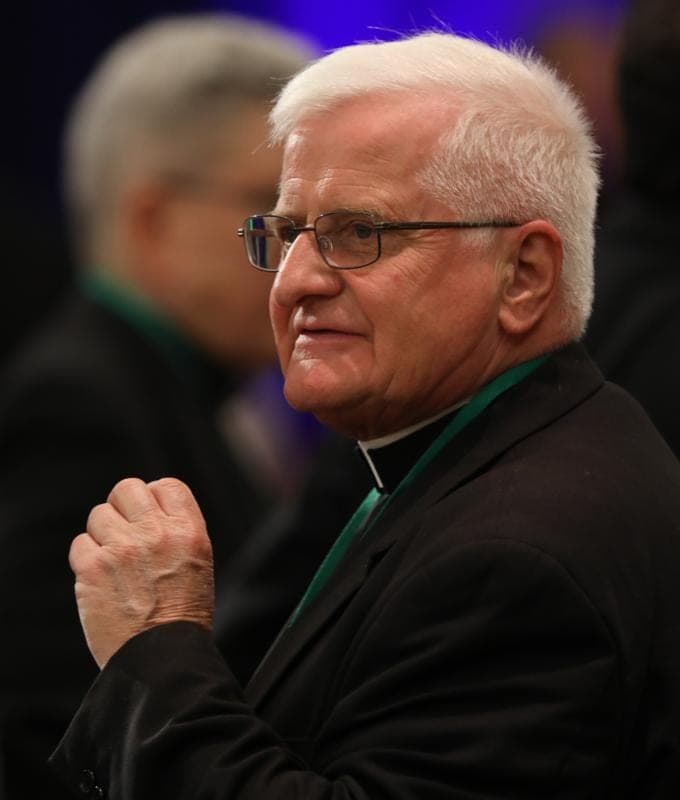WASHINGTON, D.C. — Pope Francis has accepted the resignation of Auxiliary Bishop Edward M. Grosz of Buffalo, New York, who on Feb. 16 turned 75, the age at which bishops are required by canon law to turn in their resignation to the pope.
His retirement was announced March 2 in Washington By Archbishop Christophe Pierre, apostolic nuncio to the United States.
A priest of the Buffalo Diocese, Grosz was appointed an auxiliary bishop of the diocese by St. John Paul II Nov. 22, 1989. He was ordained a bishop Feb. 2, 1990.
Grosz will continue to provide sacramental ministry throughout the diocese in his retirement, according to a diocesan statement.
Edward Michael Grosz was born Feb. 16, 1945, the second of three sons of the late Joseph and Helen Grosz. His older brother, Ronald, lives in Denison, Texas and younger brother Thomas resides in Erie, Pennsylvania.
Growing up in Buffalo’s Black Rock section, he attended Assumption School, the Diocesan Preparatory Seminary, both in Buffalo, and St. John Vianney Seminary in East Aurora, where he received a bachelor of arts degree in philosophy and a master of divinity degree.
He was ordained to the priesthood for the Buffalo Diocese May 29, 1971. After his ordination, Grosz attended the University of Notre Dame in South Bend, Indiana, where he earned a master’s degree in liturgy.
Following his return to Buffalo, he had a number of parish assignments. He was named a monsignor Oct. 15, 1988. In 1996, he was named episcopal vicar of the Western Niagara vicariate. Then he was appointed in October 2003 as pastor of St. Stanislaus Parish in Buffalo, and as episcopal vicar of the Southeast Buffalo vicariate.
On May 24, 2004, the College of Consultors of the Diocese of Buffalo elected Grosz diocesan administrator. He served in that position until Oct. 28, 2004, when Bishop Edward U. Kmiec was installed as the 13th bishop of Buffalo.
For 11 years, Grosz was chaplain for the Felician sisters in Buffalo at their motherhouse in Cheektowaga.
In addition to his parish assignments, Grosz has had significant experience in administrative positions. From 1975 to 1980, he was the executive secretary of the diocesan Liturgical Commission. In 1976, Bishop Edward D. Head of Buffalo named him director of the diocesan Office of Worship. Fourteen years late he received his first pastorate at St. Philip the Apostle Parish.
In November 2003, Grosz became the chaplain of the Western New York Division of the Polish American Congress.
Grosz has held and continues to hold a number of positions on local, state and nationwide boards and committees. He was a representative of the Catholic dioceses of New York state to the national board of the Federation of Diocesan Liturgical Commissions; diocesan director of the Legion of Mary; spiritual moderator of the Blue Army of Our Lady of Fatima; and the director of the 600th Czestochowa Jubilee Celebration.
In addition, he was diocesan coordinator of the Holy Year of Redemption; coordinator of pilgrimages to the Basilica of the National Shrine of the Immaculate Conception in Washington; diocesan coordinator for the 1976 International Eucharistic Congress in Philadelphia, and coordinator of the diocesan Marian Year Committee.
In 1987, Grosz became the official liaison between the Diocese of Buffalo and the Ukrainian Byzantine Catholic Community of Buffalo. He received biritual faculties from Rome giving him the ability to minister in Ukrainian Byzantine parishes on occasion.
He also has been very involved in dialogue between the Catholic Church and the Polish National Catholic Church.
Grosz was diocesan coordinator of the visit to Buffalo of Cardinal Josef Glemp, primate of Poland, in 1991, as well as coordinator for the visit of Cardinal Henryk Gulbinowicz of Wroclaw, Poland. From 2005 to 2008, he served on the diocesan Strategic Planning Commission that developed and implemented the Journey in Faith and Grace, the parish reconfiguration plan.
Crux is dedicated to smart, wired and independent reporting on the Vatican and worldwide Catholic Church. That kind of reporting doesn’t come cheap, and we need your support. You can help Crux by giving a small amount monthly, or with a onetime gift. Please remember, Crux is a for-profit organization, so contributions are not tax-deductible.















